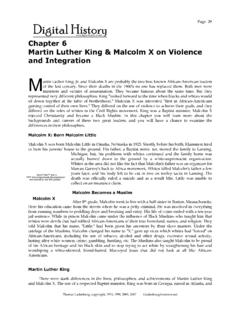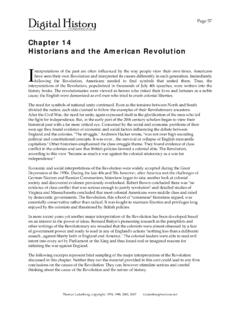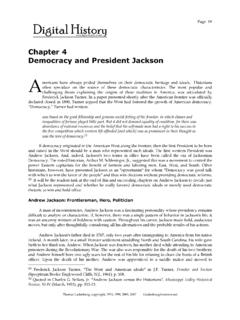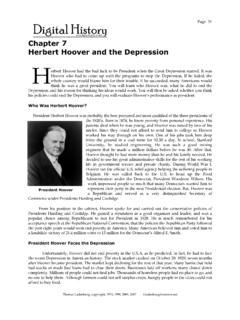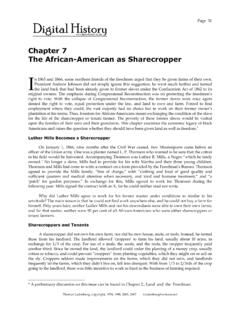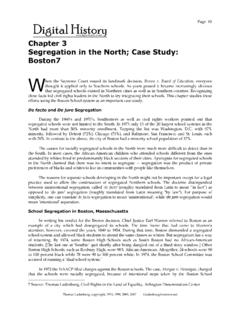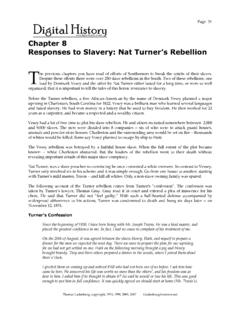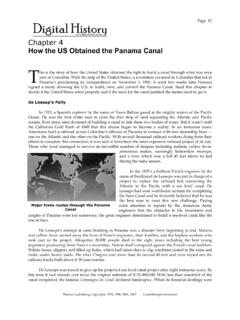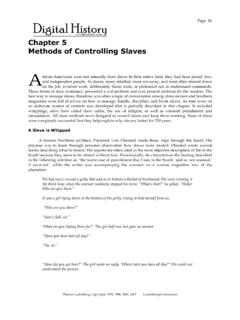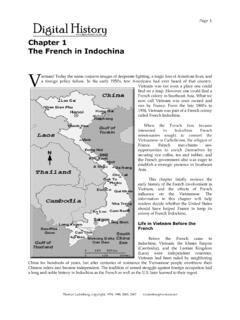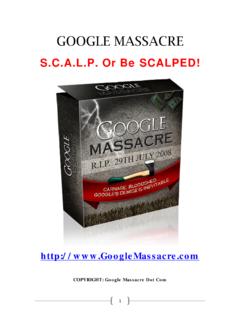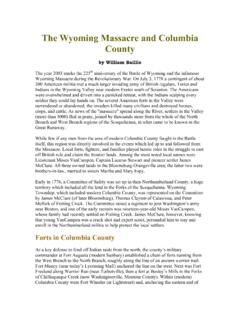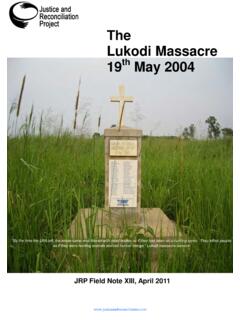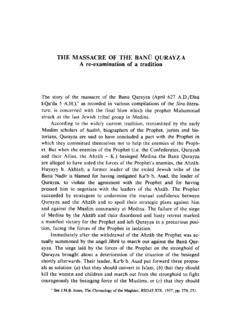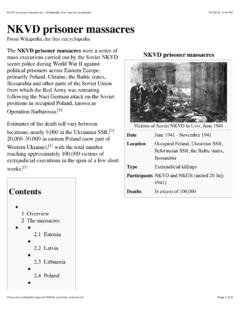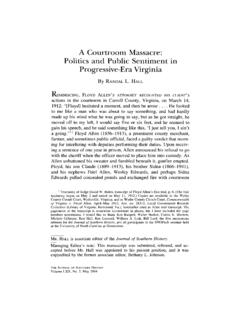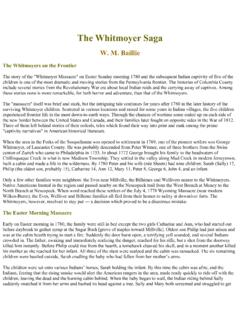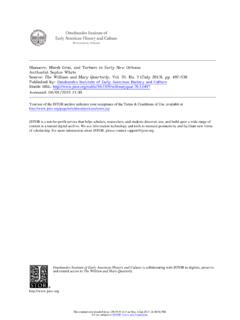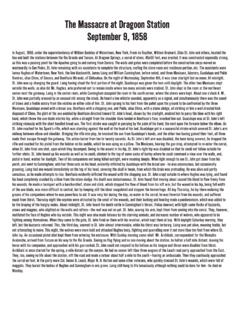Transcription of Chapter 9 The Boston Massacre S - Digital History
1 Page 38 Chapter 9 The Boston Massacre chool boys threw rock-filled snowballs at them; respectable citizens openly tormented them; employers denied them honest jobs; inn keepers refused to serve them; and the best people in town avoided their company. The men who suffered these abuses were the British soldiers stationed in the colonies. Two regiments had been sent to Boston to keep order after the Stamp Act riots. Some were housed in Faneuil Hall; others camped on the Boston Commons. Colonists, who had long feared the presence of a standing army, hated these soldiers and regarded them as an occupying army sent to take their away freedom. S The British troops were not always innocent victims of the abusive colonists.
2 Soldiering was one of Europe's least respected professions, and people with education or opportunity either became officers or avoided the service altogether. Ill-mannered and illiterate, the soldiers spent so much time drinking, British officers worried that they would lose their army completely to "demon rum." The soldiers challenged decent citizens in the streets by day and brawled with Bostonians in taverns at night. For eighteen months they harassed and were harassed by the citizens of Boston . Perhaps it was only a matter of time before the hatred between soldiers and citizenry would explode into serious violence. The violence occurred on a March evening in 1770 when a small detachment of troops fired into a mob, leaving eleven dead or wounded.
3 This " Boston Massacre " raised two important issues: the right of citizens to challenge authority and the right of the government to maintain order. These are issues that citizens and governments have argued about for centuries and continue to argue today. Incident at the Ropewalk Fighting first erupted between town and troops on March 2nd, three days before the Massacre itself. Following a common practice of off-duty soldiers, Private Patrick Walker was looking for work. His search brought him to John Gray's Ropewalk where available workers often picked up jobs at odd hours mending the miles of rope used by the many vessels docking in Boston . Rope maker William Green spotted Pvt. Walker and asked him whether he wanted to work.
4 "Yes, I do, faith,"' the soldier replied, and promptly was told he could empty the public toilet. "Empty it yourself." More words followed and getting the worst of the argument, Walker swung wildly at Green. Nicholas Ferriter, another employee, joined the battle and knocked the off-duty soldier on his backside. The sword he carried beneath his coat fell to the floor. Walker fled to get reinforcements and returned a few minutes later with Private William Warren and seven or eight other soldiers. A larger group of rope makers gathered to beat them back. Within 15 minutes nearly forty soldiers were on the scene. The battle resumed and both Sam Gray (a colonist) and Private Mat Kilroy (a soldier) distinguished themselves in the fighting.
5 The engagement ended with the British again driven to cover, but smaller engagements occurred over the next two days. Three days later, Gray would be dead, felled by a British bullet, and privates Warren and Kilroy would be charged with murder Thomas Ladenburg, copyright, 1974, 1998, 2001, 2007 Page 39 The Battle over the Barber's Bill Only a quarter moon lit Boston 's streets on the chilly but pleasant evening of March 5, l770. A solitary sentry, Private Hugh White, paced before the Customs House on King Street. Edward Garrick, a teenager apprenticed to a colonial wigmaker, approached the scene where he spied Lt. Goldfinch and accused him of owing money to his master.
6 Knowing that he carried the receipt for his bill, Goldfinch ignored the accusation. Garrick continued the provocation, telling passers-by that Goldfinch was cheap and would not pay his bills. Private White came to defend his superior, calling Goldfinch a gentleman who paid what he owed. Garrick pressed his point. A 20th century interpretation of the Boston Massacre . "Let me see your face," White challenged. Garrick replied that he was not afraid to show his face, and without another word, the soldier swung his musket down on the side of the lad's head. Screaming in pain, Garrick ran away, but several of his friends remained on the scene, taunting the soldier. "Lobster, son of a bitch," they called him; "Damned rascally scoundrel lobster son of a bitch.
7 " Meanwhile the church bell began to toll the alarm for a fire. Men began shouting fire and poured into the street. The crowd around Hugh White increased to fifty, and the taunts were accompanied by snowballs. White, plainly frightened, retreated to the Custom's House steps and loaded his rifle. The crowd then picked up chucks of ice and threw them at the sentry. Private White Gets Reinforcements As more colonists poured out into the streets, Captain Preston selected seven men, including Privates Kilroy, Montgomery and Warren. With fixed bayonets but unloaded muskets, the small detachment pressed through the heavy throng of colonists surrounding the Custom's House. The crowd parted to let the soldiers by and closed in behind them.
8 Upon reaching their destination, the soldiers loaded their rifles with double shot and formed a semi-circle around the Custom's House, protecting it and their own flank. Preston stood in front of his men, facing the crowd, which by this time numbered upward of 300. The mob pressed upon the soldiers, rapping muskets barrels with their clubs and hurling insults. Emboldened by the misconception that soldiers could not shoot unless ordered by a civilian, the crowd dared them to fire. In the midst of this confusion, a club was thrown from somewhere within the crowd knocking Private Montgomery to the ground. Rising to his feet in pain and frustration, Montgomery raised his weapon and pulled the trigger. No one seemed to be hit. Richard Palmes, who hitherto had acted as peacemaker, swung his club, striking Montgomery in the arm.
9 Palmes slipped as he aimed a blow at the Captain's head and struck him on the arm. Another colonist, attacking with a stick, was repelled with bayonet wounds in the biceps and in the chest. The shot, however, had scared many of the colonists away and left the center of the British line fairly clear. For a brief moment there was a pause, lasting somewhere between six seconds and two minutes. Thomas Ladenburg, copyright, 1974, 1998, 2001, 2007 Page 40 Death on King Street During the pause after Montgomery's shot, Private Kilroy raised his musket, pointing it in the direction of Sam Gray and Edward Langford, both colonists. "God damn you, don't fire," Langford yelled. But Kilroy squeezed the trigger without appearing to aim and Gray, his hands in his pockets, fell dead at Langford's feet.
10 John Hickling ran up and felt a hole in Gray's head as large as a fist. Two more shots rang out and Crispus Attucks, a 6'2" former slave, fell dead on the ground with two bullets in his massive chest. Then someone suggested moving in on the soldiers to stop their firing. More shots. Struck by two bullets, a sailor named James Caldwell died instantly. Patrick Carr and Samuel Maverick were seriously wounded. Five colonists were killed that night, and another six were wounded. Governor Hutchinson Promises Justice The muskets were reloaded and in firing position as the stunned colonists returned to recover their dead and wounded. Preston ordered his men not to fire, and further trouble was avoided that night. Later in the evening, a huge crowd listened as Governor Hutchinson, addressing them from the Town House balcony facing King Street, advised them to go home peacefully for "the law shall have its course; I will live and die by the law" As the governor returned to the council chamber, someone else took over the balcony and told the crowd to remain until the soldiers returned to their barracks.
